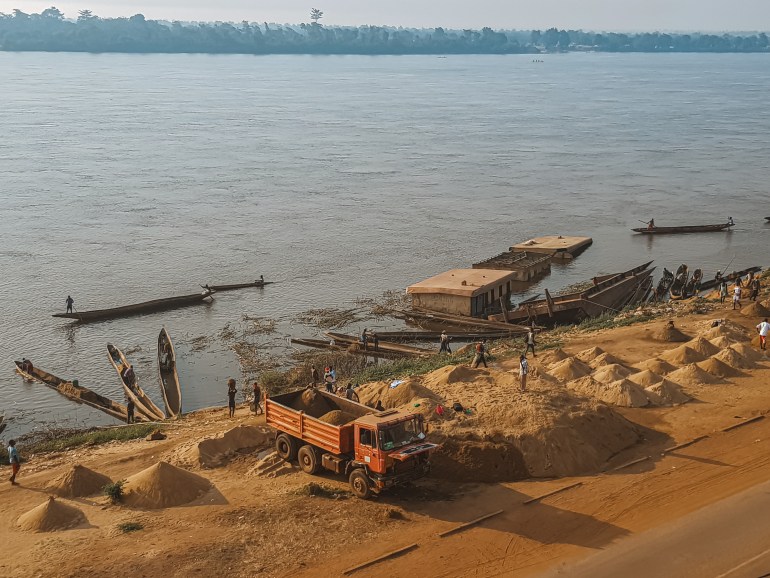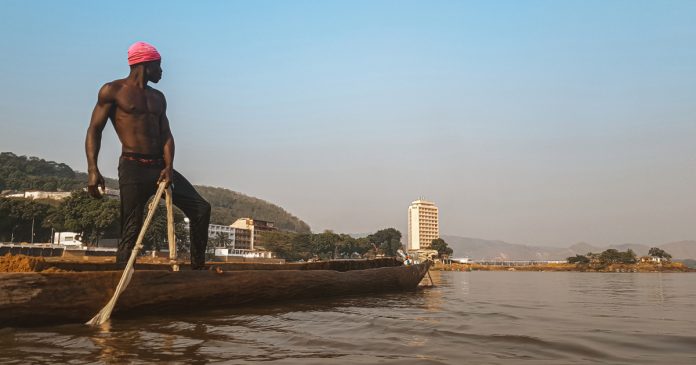[ad_1]
Bangui, Central African Republic – As if summoned by the setting sun, dozens of wooden canoes laden with a precious cargo come in to moor on the shores of the Ubangi River.
Young men disembark from the boats and converge in the cool shade of a mango tree, while porters begin to unload their catch. A sweet palm wine makes the rounds as the smoke of cigarettes billows into the air.
Although they have spent their day out on the water, these men are not after the river’s staple fish, the capitaine (Nile perch). Rather, the men known locally as “sandfishers” dive to collect sand from the riverbed for construction.
This decades-old industry provides essential sand to builders, who mix it with cement to fuel Bangui’s construction industry. It is also a lifeline for hundreds in the Central African Republic’s (CAR) capital, Bangui, where poverty is rife and work scarce.
“In one day, I can make up to 30,000 francs ($50) when the price [of sand] is very high,” a sandfisher named Achill told Al Jazeera, although he said his typical daily earnings are closer to 12,000 francs ($22).
“The porters who unload the canoe can make up to 5,000 ($9), but you must be strong to do this work,” he added.
 Sand extraction is a lifeline to hundreds in the CAR’s impoverished capital [Amaury Falt-Brown/Al Jazeera]
Sand extraction is a lifeline to hundreds in the CAR’s impoverished capital [Amaury Falt-Brown/Al Jazeera]
But the livelihoods of these men are at risk by a resurgence in violence that is threatening to once again engulf CAR, a resource-rich but poverty-stricken country where armed groups control large swaths of territory.
On January 13, an assault on Bangui led by a new rebel coalition vying to overthrow the re-elected President Faustin-Archange Touadera saw the labourers abandon the river and flee the city, leaving families without a daily income.
As a diver, 30-year-old Achill earns a decent living when compared with the meagre wages earned by most in CAR – where some 71 percent live below the poverty line of $1.90 per day – a wage reflective of the hardship of his trade. The legacy of decades of instability means people must find employment wherever possible.
“Look at our capital. There are no jobs here, so you find whatever work you can,” Achill said.
Along with an assistant, divers are commissioned by canoe owners to dig and extract the sand.
Depending on the type of sand that a customer has ordered – fine grain, large grain or gravel – divers must go to varying lengths to earn their daily bread.
Gravel is the most prized material, and the most difficult to reach. Resting at the river’s deepest points, it draws skilled divers into perilous waters.
Equipped with nothing but a bucket, they must battle strong currents and the cold to plunge blindly through murky waters and fill the lone utensil.
In between dives, Joel takes a breath before coolly explaining that the river “is not deep at the moment – only six metres (20 feet)”.
During the rainy season, Joel says divers “can go down to 12 metres” – others claim it is 15 metres. Achill simply indicates the depth to which he dives by pointing to the top of the towering mango tree.
Joel’s assistant, Belphin, waits patiently above on the canoe, a rope between his hands until he feels a tug before hauling up another load, his statuesque physique suddenly in motion.
Having reached its fill, the canoe glides slowly downstream to its owner.
Raphael owns two canoes and knows this trade well; so well, in fact, that he has earned the title of “delegate” of the sandfishing community of Bangui’s 7th Arrondissement (neighbourhood).
“If you ask for Raphael, people might not know who you are talking about, but when you ask for the ‘delegate’, they will know,” he said proudly.
At 56, the father of 12 is considered elderly in a country where the World Bank estimates the average life expectancy to be 53. That, plus the four decades he has spent scraping a living on these shores, has earned him the honorific he is so fond of.
With the raspy voice of a seasoned smoker, Raphael said that “the diver is in a lot of pain when he dives. The pressure from repeatedly going so deep often makes their ears bleed and gives them headaches.”
Achill has first-hand experience.
“I have to take drugs [to handle the pain] – sometimes I take paracetamol; sometimes I go to the hospital to get injections,” he said.
 A resurgence in violence in conflict-prone CAR threatens the sandfishers’ livelihoods [Amaury Falt-Brown/Al Jazeera]
A resurgence in violence in conflict-prone CAR threatens the sandfishers’ livelihoods [Amaury Falt-Brown/Al Jazeera]
Still, the men working in this trade prefer to struggle and earn an honest living than to join the armed groups.
The community forms part of a growing economic ecosystem in the city that has until recently offered a more hopeful future – the looming spectre of conflict, however, threatens that progress.
The last time Bangui fell to armed groups, in 2013, Raphael said that the sandfishers abandoned the river.
Rebel armed groups – which control about two-thirds of the volatile country – launched an offensive a week before presidential elections on December 27.
They attempted to blockade Bangui and carried out several attacks on key national highways.
The constitutional court on Monday officially declared Touadera the winner of the polls, which were marked by a very low turnout mainly due to insecurity.
On January 13, armed groups launched two simultaneous attacks on Bangui but were repelled by MINUSCA, the United Nations peacekeeping force.
On Thursday, the government announced a 15-day state of emergency.
However, rebels are targeting a vital supply route into the city via Cameroon that is vital for cement imports – there are no functional cement factories in CAR.
The UN has called the situation “alarming” and says 1,600 trucks are stuck in Cameroon.
If this continues, Achill and his colleagues will likely be out of a job and construction in the city will grind to a halt.
Reflecting on the future, Raphael – who has lived through several brutal conflicts – says a war will destroy their livelihood.
“Peace is best for our work.”
[ad_2]
Source link











